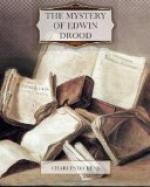However, the last remark had better be answered. So, says Edwin:
‘I don’t know, Mr. Neville’ (adopting that mode of address from Mr. Crisparkle), ’that what people are proudest of, they usually talk most about; I don’t know either, that what they are proudest of, they most like other people to talk about. But I live a busy life, and I speak under correction by you readers, who ought to know everything, and I daresay do.’
By this time they had both become savage; Mr. Neville out in the open; Edwin Drood under the transparent cover of a popular tune, and a stop now and then to pretend to admire picturesque effects in the moonlight before him.
‘It does not seem to me very civil in you,’ remarks Neville, at length, ’to reflect upon a stranger who comes here, not having had your advantages, to try to make up for lost time. But, to be sure, I was not brought up in “busy life,” and my ideas of civility were formed among Heathens.’
’Perhaps, the best civility, whatever kind of people we are brought up among,’ retorts Edwin Drood, ’is to mind our own business. If you will set me that example, I promise to follow it.’
‘Do you know that you take a great deal too much upon yourself?’ is the angry rejoinder, ’and that in the part of the world I come from, you would be called to account for it?’
‘By whom, for instance?’ asks Edwin Drood, coming to a halt, and surveying the other with a look of disdain.
But, here a startling right hand is laid on Edwin’s shoulder, and Jasper stands between them. For, it would seem that he, too, has strolled round by the Nuns’ House, and has come up behind them on the shadowy side of the road.
‘Ned, Ned, Ned!’ he says; ’we must have no more of this. I don’t like this. I have overheard high words between you two. Remember, my dear boy, you are almost in the position of host to-night. You belong, as it were, to the place, and in a manner represent it towards a stranger. Mr. Neville is a stranger, and you should respect the obligations of hospitality. And, Mr. Neville,’ laying his left hand on the inner shoulder of that young gentleman, and thus walking on between them, hand to shoulder on either side: ’you will pardon me; but I appeal to you to govern your temper too. Now, what is amiss? But why ask! Let there be nothing amiss, and the question is superfluous. We are all three on a good understanding, are we not?’
After a silent struggle between the two young men who shall speak last, Edwin Drood strikes in with: ’So far as I am concerned, Jack, there is no anger in me.’
‘Nor in me,’ says Neville Landless, though not so freely; or perhaps so carelessly. ’But if Mr. Drood knew all that lies behind me, far away from here, he might know better how it is that sharp-edged words have sharp edges to wound me.’
‘Perhaps,’ says Jasper, in a soothing manner, ’we had better not qualify our good understanding. We had better not say anything having the appearance of a remonstrance or condition; it might not seem generous. Frankly and freely, you see there is no anger in Ned. Frankly and freely, there is no anger in you, Mr. Neville?’




